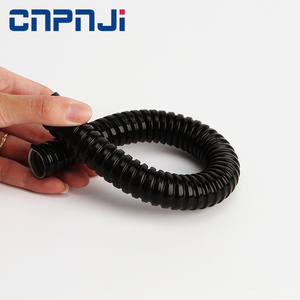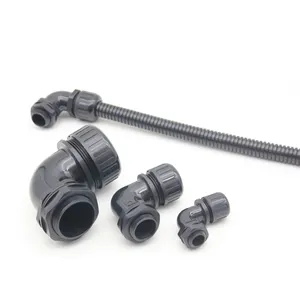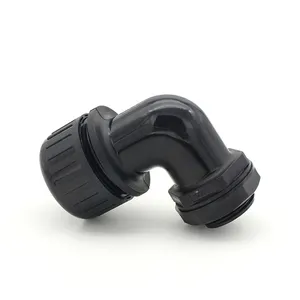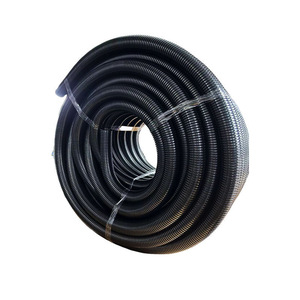(7174 products available)


































































































































































































































A black electrical conduit is a tube used in electrical wiring to protect and route electrical cables. It comes in different types and materials, offering options for various applications. Here are the main types of electrical conduits:
Rigid Metal Conduit (RMC)
This is a heavy-duty conduit made of galvanized steel or aluminum. It is strong and offers excellent protection against impact and moisture. It is mostly used in commercial and industrial applications where cables need to be protected from mechanical damage. It can be installed through threading or using fittings and connectors.
Intermediate Metal Conduit (IMC)
IMC is a type of rigid metal conduit. It is similar to RMC but lighter and thinner. It is mostly used in commercial and industrial applications. It comes in different diameters and is usually made of steel, zinc-coated steel, or aluminum. IMC can be installed using threaded or non-threaded fittings.
Galvanized Rigid Conduit (GRC)
This is a non-threaded rigid conduit. It is made of steel, with a zinc coating to prevent rusting. The zinc coating makes the GRC more durable and suitable for applications exposed to harsh weather conditions. It is mostly used in outdoor applications and areas where the conduit is likely to be exposed to moisture or chemicals.
Rigid PVC Conduit
This type of conduit is made from polyvinyl chloride (PVC) plastic. It is lightweight, easy to install, and resistant to moisture, chemicals, and corrosion. It is mostly used in underground installations, wet locations, and areas where metal conduits may be prone to rust. There is also an alternative type of Rigid PVC Conduit called Rigid Non-Metallic Conduit. It is mostly used for raceway applications and is resistant to UV rays, chemicals, and moisture.
Electrical Metallic Tubing (EMT)
EMT is a thin-walled steel or aluminum tube. It is lighter and more affordable than other metal conduits. It is usually used in dry interior locations, commercial and industrial buildings. It protects wires from mechanical damage in environments with minimal exposure to moisture or chemicals. Its installation involves bending the EMT to the required shape and using connectors and couplings to secure it.
Flexible Metal Conduit (FMC)
This conduit consists of a flexible, interlocked metal sheath. It allows for bending and routing through tight spaces and is used where flexibility and protection from mechanical damage are required. It is suitable for applications where cables need to be routed around obstacles or in areas with limited space.
Protection
Both types of conduit (rigid and flexible) provide protection for electrical wiring against impact, abrasion, and environmental hazards. They help prevent wires from being cut, scrapped, or damaged by heat, moisture, debris, or sharp objects. This is especially important in areas with high foot traffic or where heavy machinery operates. The conduits act as a shield for the wire, helping to extend their lifespan and ensure they remain in good working condition.
Support and Organization
Black metal conduit for electrical helps to support and organize electrical wiring systems. It helps to route and secure wires in a straight line, giving a clean and organized look to electrical installations. This makes it easy to identify and trace wires during maintenance or repairs. The support and organization of these conduits make them suitable for commercial and industrial settings with complex electrical wiring systems.
Grounding
Black electrical conduits, especially galvanized rigid conduits, provide a grounding path for electrical currents. In case of a short circuit or fault, the conduit system can safely direct the electrical current to the ground, reducing the risk of electrical shocks or fires. Grounding helps protect people and equipment from the dangers of stray or leaked electrical currents.
Aesthetics
Black electrical conduits improve the aesthetic appearance of electrical installations. The black color blends well with most backgrounds, giving a neat and professional look to wiring systems. This is particularly important in residential and commercial settings where visual appeal is essential.
UV Resistance
Black PVC conduits have UV resistance. If the electrical wiring system is installed in a place exposed to direct sunlight, the black PVC conduit will be a better choice. Its UV resistance prevents it from deteriorating or becoming brittle over time due to sun exposure.
Ease of Installation
Black electrical conduits facilitate easy installation of electrical wiring systems. They allow for easy cutting, bending, and connecting of wires, reducing the time and effort needed to install them. This ease of installation makes them a popular choice among electricians and contractors.
Concealment
Black electrical conduits help to hide or conceal electrical wiring. This is important in places where people don't want to see exposed wires, like residential homes and commercial offices. Hiding or concealing these wires improves the overall look and aesthetic appeal of a space.
The global black electrical conduit market keeps growing because many industries need conduits for their wiring systems. That means there is a consistent demand for this product among businesses.
Wholesalers and retailers can get black metal conduit and black PVC conduit in bulk from manufacturers and supply businesses and individuals doing electrical projects. Contractors and project developers prefer to buy conduits in bulk to have enough materials for entire projects instead of buying a few at a time.
Some industries that use electrical conduits include:
Conduit Size
First, consider the number and size of wires that will go inside the conduit. Larger wires for big power needs will require bigger pipes. On the other hand, smaller conduits work well with light circuits or low-voltage applications.
Conduit Material
The environment where the conduit will be installed helps select the right material. PVC conduits come in handy and are lightweight for above-ground installations. In contrast, EMT pipes are easy to find in various sizes and diameters.
Installation Environment
The installation environment dictates whether to use rigid or flexible conduits. Ridge conduits are best for straight-line installations, while flexible conduits help connect devices in tight corners and moving parts.
Compliance and Standards
Check local regulations and building codes to know the approved types and sizes of conduits suitable for the project. This ensures safety and compliance with industry standards.
Appearance
Although the conduit is mainly for function, its look is important when it is visible. Black conduits blend better with dark backgrounds and are less noticeable. Consider the aesthetic impact in exposed installations like basements or garages.
Conduit Covers
Look for covers that fit the planned installation. Factors to consider include ease of installation, cost, and the level of protection needed. Heavy-duty covers provide the most protection, while light ones are easier to install.
Conduit Support
Plan how to support the conduits during installation. Pipes need support brackets at intervals along their length. Check that the supports are suitable for the conduit type, whether rigid or flexible.
Q1. What is the black coating on electrical conduits?
A1. The black coating on electrical conduits is known as a protective finish. It helps to protect galvanized steel conduits from corrosion and environmental damage. It also helps to reduce glare and improves aesthetics during installations.
Q2. What are the types of black electrical conduits?
A2. There are several types of black electrical conduits. These include:
Q3. Why are electrical conduits black?
A3. The black color of electrical conduits serves several purposes. First, it helps to dissipate heat by allowing the conduit to radiate it into the environment. Secondly, the black color provides UV protection. It prevents the conduit from becoming brittle due to prolonged exposure to sunlight. Lastly, the black color improves the aesthetics of the electrical installation.